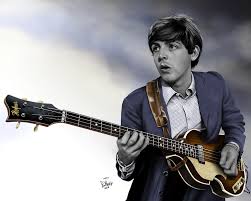On a quiet morning in wartime Liverpool, history was being made in the most ordinary of ways. Shortly after two o’clock on 18 June 1942, Mary Patricia McCartney gave birth to her first son at Walton Hospital. The baby, christened James Paul McCartney, entered a world torn apart by conflict, but would grow up to help heal it with music.
The timing could hardly have been more significant. Britain was deep in the throes of World War II, with Liverpool bearing the brunt of German bombing raids due to its vital port facilities. Amidst the chaos and uncertainty, Mary McCartney—a qualified nurse and midwife—was fortunate to secure a private bed at the hospital, a luxury during those austere times.
Paul’s father, Jim McCartney, was serving as a volunteer fireman whilst maintaining his day job, risking his life nightly to combat the fires that raged across the city during air raids. Despite the dangers, Jim found solace in his passion for jazz music, a love that would prove instrumental in shaping his son’s future career. Both parents shared Irish heritage, bringing a rich cultural background to their growing family.
The newborn’s arrival wasn’t without its drama. Family members later recalled with amusement that baby Paul was hardly the picture of cherubic perfection. “He looked awful. I couldn’t get over it. Horrible. He had one eye open, and he just squawked all the time,” one relative remembered, though this inauspicious start would prove no indicator of his future charm and talent.



The McCartney household was one of modest means but rich in warmth and musical appreciation. Mary’s work as a midwife provided the family with a steady income, whilst Jim’s musical background—he played piano and led his own jazz band called Jim Mac’s Jazz Band—filled their home with melodies and rhythms. This musical environment would prove crucial in nurturing young Paul’s natural talents.
Liverpool in 1942 was a city under siege but also one of remarkable resilience. The community spirit forged during these difficult years would later influence Paul’s approach to music-making and his belief in the power of collaboration. The working-class values instilled during his childhood in this tough but loving environment would remain with him throughout his meteoric rise to fame.
Little could anyone have imagined that this squawking infant would grow up to become one of the most successful musicians in history. Paul McCartney would later transform popular music alongside his Beatles bandmates, elevating it from mere entertainment to high art. His melodic genius, evident in songs like “Yesterday” and “Hey Jude,” would touch millions of lives across the globe.
The baby born on that June morning in 1942 would eventually receive a knighthood, win multiple Grammy Awards, and be inducted into the Rock and Roll Hall of Fame twice. But perhaps most remarkably, he would help prove that music truly could change the world, spreading joy and unity across cultures and generations.
From those humble beginnings in wartime Liverpool, Paul McCartney’s journey to becoming a musical legend had begun. as a volunteer fireman during the conflict while maintaining his passion for jazz music, which would later influence young Paul’s musical development.
newshub finance



Recent Comments